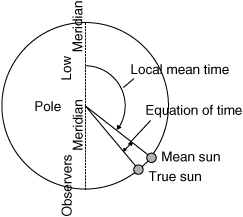mean sun — noun a theoretical sun that moves along the celestial equator at a constant speed and completes its annual course in the same amount of time the real sun takes at variable speeds • Hypernyms: ↑model, ↑theoretical account, ↑framework * * * noun… … Useful english dictionary
mean solar day — The period between two successive transits of a particular meridian on the earth by the astronomical mean sun. The length of a mean solar day is 24 h 3 min 56.555 s. It is divided arbitrarily into twenty four units known as mean solar hours. Also … Aviation dictionary
Astronomical distance — Astronomical distances are distances in outer space, occurring on a much larger scale than those on Earth. For instance, the distance to (Proxima Centauri), the closest star to our solar system, is about 40,000,000,000,000 kilometers.For this… … Wikipedia
astronomical — 1550s, adj. from ASTRONOMY (Cf. astronomy) + ICAL (Cf. ical). Popular meaning immense, concerning very large figures (as sizes and distances in astronomy) is attested from 1899. Astronomical unit (abbrev. A.U.) mean distance from Earth to Sun,… … Etymology dictionary
astronomical unit — n. Astron. a unit of length based on the mean distance of the earth from the sun, c. 149.6 million km ( c. 93 million mi): light travels this distance in c. 8.3 minutes: abbrev. AU … English World dictionary
Astronomical unit — This article is about unit of length. For the full system of units, see Astronomical system of units. 1 astronomical unit = SI units 149.60×10^6 km 149.60×10^9 m Astronomical units 4.8481 … Wikipedia
Sun — This article is about the star. For other uses, see Sun (disambiguation). The Sun … Wikipedia
astronomical unit — Astron. a unit of length, equal to the mean distance of the earth from the sun: approximately 93 million miles (150 million km). Abbr.: AU [1900 05] * * * ▪ unit of measurement Comparative data for the Sun, planets, and other solar system… … Universalium
Astronomical naming conventions — In ancient times, only the Sun and Moon, a few hundred stars and the most easily visible planets had names. Over the last few hundred years, the number of identified astronomical objects has risen from hundreds to over a billion, and more are… … Wikipedia
Astronomical time — Time Time, n.; pl. {Times}. [OE. time, AS. t[=i]ma, akin to t[=i]d time, and to Icel. t[=i]mi, Dan. time an hour, Sw. timme. [root]58. See {Tide}, n.] 1. Duration, considered independently of any system of measurement or any employment of terms… … The Collaborative International Dictionary of English

